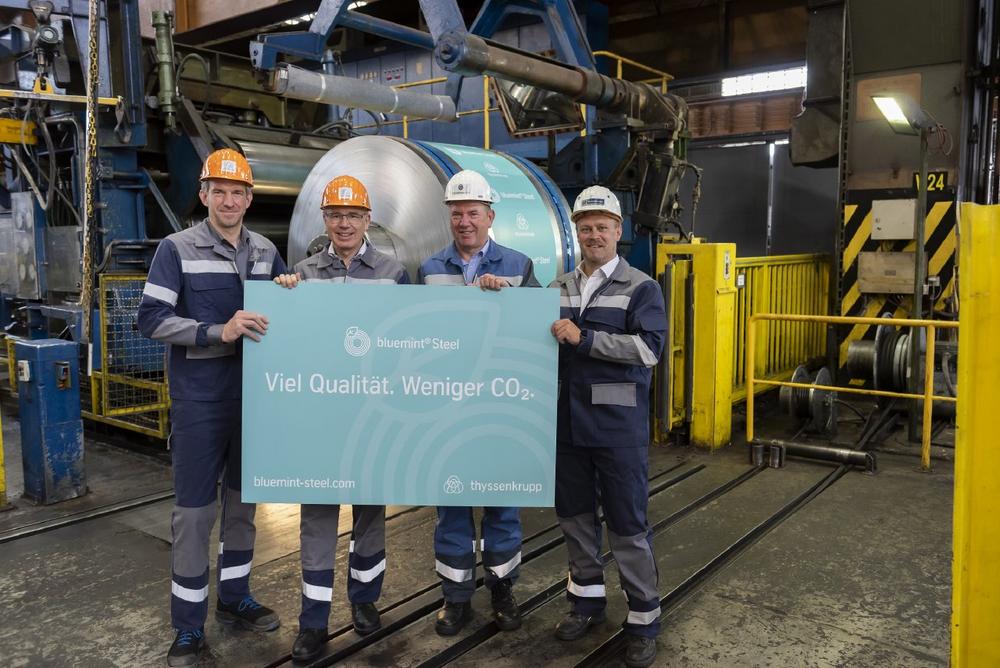- thyssenkrupp Steel Europe has agreed with the home appliance manufacturer Miele to supply CO2-reduced steel from the commissioning of the direct reduction plant in 2026.
- By 2030, thyssenkrupp Steel will be supplying Miele entirely with climate-friendly bluemint® Steel products.
- Miele uses bluemint® Steel to reduce the carbon footprint of its appliances.
In October, thyssenkrupp Steel Europe AG and the Miele Group signed a memorandum of understanding for the supply of climate-friendly steel from the direct reduction plant planned for 2026 at the Duisburg site. The first hydrogen-fueled direct reduction plant with downstream melters will have a capacity of over two million metric tons and will already reduce CO2 emissions at thyssenkrupp Steel by more than 20 percent. From the start-up of the plant, thyssenkrupp Steel will supply the leading manufacturer of premium home appliances with climate-friendly bluemint® Steel. In subsequent years, the quantities purchased are to increase step by step, with Miele and thyssenkrupp aiming to switch 100% to bluemint® Steel by 2030.
Low-CO2 steel – a decision to protect the climate
"We are particularly pleased that the use of CO2-reduced bluemint® Steel in Miele’s domestic appliances makes a sustainable and climate-friendly steel product visible to end consumers," explains Jörg Paffrath, Senior Vice President Sales Industry at thyssenkrupp Steel Europe. "Because our two companies are pursuing the same goal: protecting the climate and preserving the environment for future generations through sustainable action and climate-friendly products."
Partnership in sustainable thinking and action
The memorandum of understanding that has now been signed is also the expression of a long-standing partnership between thyssenkrupp Steel and Miele. This partnership is now being supplemented by the development of a joint sustainability concept through the supply of CO2-reduced steel.
Miele has set itself the goal of reducing CO2 emissions of its appliances in the use phase (Scope 3 emissions according to the recognized criteria of the Greenhouse Gas Protocol standard) by a further 15% by 2030 compared to 2019. Since this accounts for the majority (85%) of Miele’s emissions, it offers the greatest leverage for reducing emissions. "Our ambition is to develop the best products and services with the lowest possible impact on the environment – with the goal that they are completely carbon neutral," explains Hans Krug, Senior Vice President Procurement at the Miele Group. "To achieve this, we are in close dialog with our suppliers and are pleased to now take the next step in arranging for deliveries of CO2-reduced steel from thyssenkrupp Steel Europe AG."
About Miele:
Miele is the world’s leading supplier of premium domestic appliances for cooking, baking, steam cooking, refrigeration/freezing, coffee preparation, dishwashing, laundry and floor care. In addition, the company makes dishwashers, air cleaners, washing machines and dryers for commercial use, as well as washer-disinfection and sterilization units for medical facilities and laboratories. Founded in 1899, the company has eight production sites in Germany, one plant each in Austria, the Czech Republic, China, Romania and Poland, as well as the two plants of the Italian medical technology subsidiary, the Steelco Group. Sales in fiscal 2021 amounted to around €4.84 billion. Miele is represented in almost 100 countries/regions by its own sales companies or via importers. Now in its fourth generation, the family-run group employs around 22,300 people worldwide, some 11,200 of them in Germany. Its headquarters is in Gütersloh, in the Westphalia region of Germany.
thyssenkrupp Steel Europe AG is Germany’s biggest steel manufacturer. The Duisburg-based company with around 26,000 employees is one of the world’s leading suppliers of high-quality steel products for innovative and demanding applications, as well as for providing steel-related services. Steel production at thyssenkrupp Steel Europe is planned to be completely climate-neutral by 2045 at the latest. The decisive step in this direction will be the construction of hydrogen-based direct reduction plants in conjunction with innovative melting units. The first plant is scheduled to go on stream in Duisburg in 2026. Production of five million metric tons of low-CO2 steel is already planned for 2030.
thyssenkrupp Steel Europe AG
Kaiser-Wilhelm-Str. 100
47166 Duisburg
Telefon: +49 (203) 52-0
Telefax: +49 (203) 52-25102
http://www.thyssenkrupp-steel-europe.com
Public-/Media Relations
Telefon: +49 (203) 52-44916
E-Mail: roswitha.becker@thyssenkrupp.com
![]()
